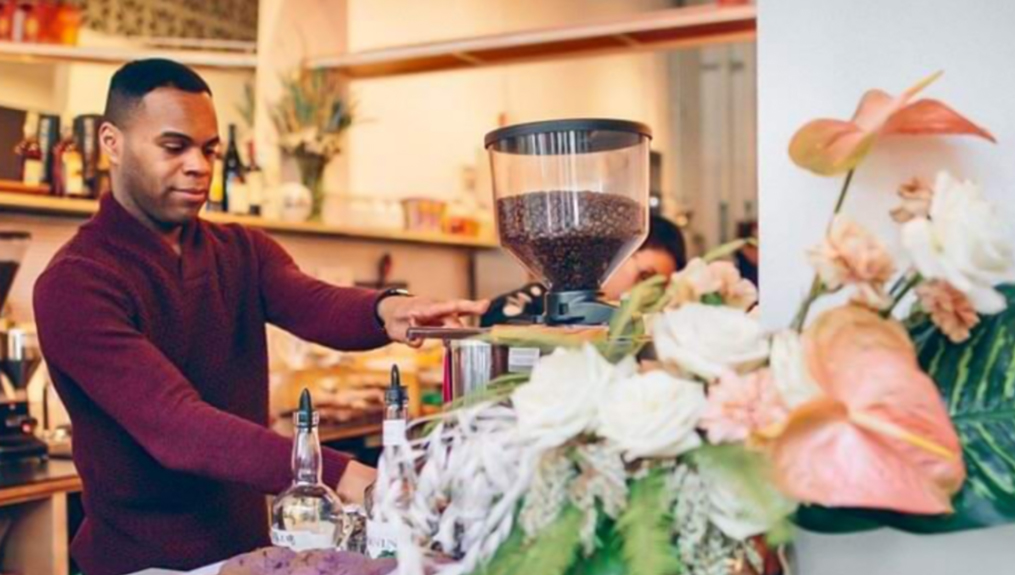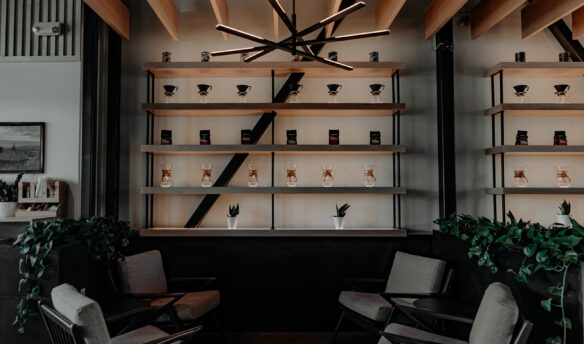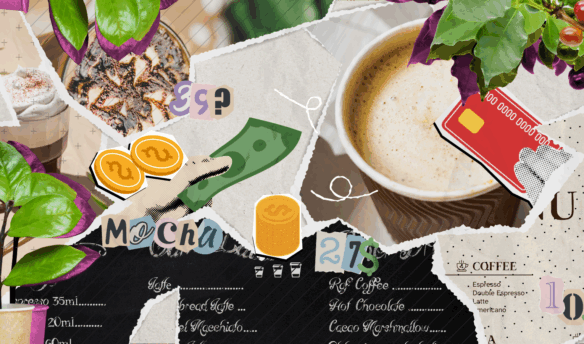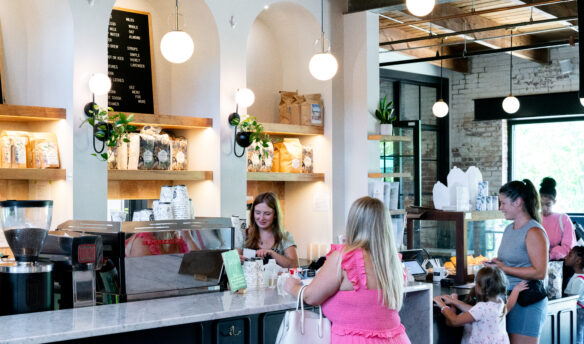Anton Coleman, manager and barista trainer at Hood Famous Bakeshop, reported “at least two to three times a day, [we] wipe every sort of touchable surface: the door handle to the store, the exit handles, the bathroom, the portafilters, general things we touch the most, we’ve just been doing an extra wipedown.” Photo courtesy of Anton Coleman.
Café Owners and Managers Meet the Challenges of Staying Open in the Epicenter of COVID-19
Since Seattle became the epicenter of the coronavirus outbreak in the U.S., life for many people in the city has changed. Companies including Amazon, Facebook, and Microsoft are urging employees to telecommute, Governor Jay Inslee is restricting large gatherings, “social distancing” has entered common parlance, and the initial panic wiped stores out of hand sanitizer. With an increasing number of people staying at home, Seattle cafés have seen a marked decrease in business, even before an employee tested positive for the virus at a downtown Starbucks.
Starting last week, Anton Coleman, the manager and barista trainer at Hood Famous Bakeshop’s Café + Bar in Seattle’s Chinatown/International District, has seen a drastic change.
“It’s kind of eerie, you walk outside . . . around 12 to 2 p.m., people are [usually] out finding food, or getting coffee,” says Coleman. “It’s been an eerie difference to walk out around that time and it’s super quiet. Never seen it that quiet.”
Hood Famous is next to a light rail transit station, downtown offices, and close to CenturyLink Field. While last week brought a significant drop in business when more people started working from home, Hood Famous’ Chinatown neighbors have felt the effects for a month or more.
“Most food establishments around us have seen a 40 to 50 percent decrease in foot traffic,” says Coleman. “People have been posting ignorant statements [on social media] like, ‘Oh I don’t want to go there. I may catch the virus.’ So we know that the stigma is there, and the ignorance of people because of the origins of this particular virus. There’s blatant issues of racism and ignorance that has been shown.”
Jill Killen, owner of Cloud City Coffee and El Diablo Coffee Co., says she has seen a 10 to 20 percent decrease in revenue since the outbreak. Like many, she’s taking precautions to sanitize frequently touched surfaces. Baristas and shift leads “walk around and clean doorknobs,” explains Killen. “We wipe down all the condiment handles. We still have self-serve coffee out, but the next-level plan is to pull self-serve coffee and pull condiments as well.”
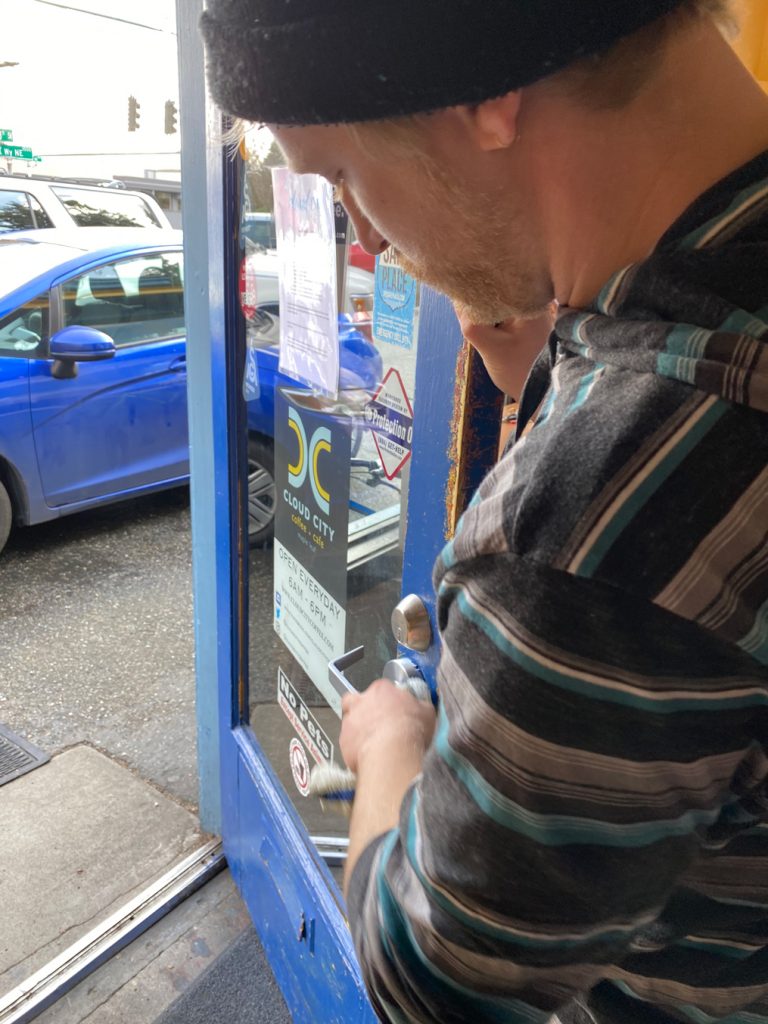
Even though she’s taking coronavirus concerns seriously, she also questions, “What point should I go all in and do what feels like overboard, or am I gonna look back in two weeks and think, ‘Man I didn’t do enough’? Walking that line is the thing keeping me up at night right now.”
Both Coleman and Killen say they might reduce café hours, or close on certain days if business continues to dip. Killen asserts that after the two slowest months of the year, being hit with an additional lack of traffic is exceptionally hard. Cafés and their employees still have bills to pay.
“This type of business doesn’t have high profit,” she adds. “It’s not like any of us are just sitting on this great amount of wealth to say, ‘Well we’ll just close for a month and we’ll pay you anyway.’ That’s just not possible. You run really close to the edge a lot. It’s just about being smart, cutting your orders down, lowering your pars, trying to get some of your bills lowered, as you go into what you project to be a slower time.”
Killen has considered starting a localized delivery service if foot traffic slows even more, or partnering with an established service like DoorDash. Cloud City Coffee Roasters also sells coffee through subscription company Bean Box, which is an additional source of income.
Christos Andrews, owner and coffee director of Ghost Note Coffee, made an Instagram post to address the flagging sales. Andrews explains that the post was intended to convey the message, “Hey, we appreciate that everyone’s being careful with health, but we’re small businesses. We need consistent traffic, so you should stay healthy, but also, go out and support local businesses.”
Ghost Note tagged several other small businesses in the post, and issued a Square coupon via email.
“We actually had one of our busiest Saturdays in a long time [last weekend], which was really great,” says Andrews. “I’m not sure that it totally makes up for the really lackluster week, but it made me really hopeful.”
Operating a café in the time of an outbreak, and managing the collective anxiety surrounding it, is a new challenge. Coleman, Killen, and Andrews all agree that clear communication with staff and customers is the best thing to do.
“My biggest advice to owners and café managers would be to just be honest with their team,” recommends Coleman. “Follow the updates that are coming in from the Governor and the state health department and keep the baristas informed.”
When asked what else he would like the community to know, Coleman adds, “That we are open.”
How To Reduce the Risk of COVID-19 at Your Café
- Remind sick employees that they must stay home.
- Have employees wash their hands before, during, and after their shift.
- Refresh your sanitizer bucket often, and wipe down commonly touched surfaces like doorknobs and condiments frequently with sanitizer or a bleach solution. Act as if you were preparing for an incredibly thorough health inspection.
- Communicate with your staff about public health updates, and any schedule changes or adjustments. Be available to listen to employee concerns.
- Communicate with your customers in-person, through posted notices, or social media about the ways your café is minimizing risk.
- Research any help that may be applicable to your small business, or employees. If you’re in Washington State, check it out here.



